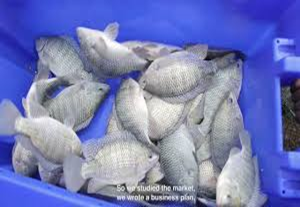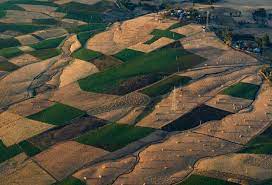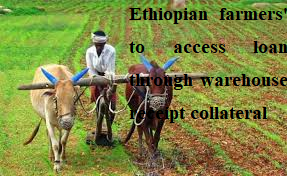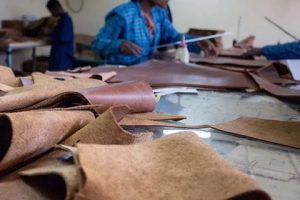
Ethiopia does have different geological formations and climatic conditions and is endowed with considerable water resources and wetland ecosystems, including river basins, major lakes, many swamps, floodplains and man-made reservoirs.
There is a lack of understanding of the fisheries production impact on the national economy in Ethiopia, as the contribution of the industry to the country’s economy has not been adequately reflected in the official Gross Domestic Product (GDP) and economic progress.
Here, small-scale fisheries and aquaculture make critical contributions to development in the specific areas in particular and the wide economic spectrum in the nation, though various means such as employment, in particular.
Keeping this in mind, The Ethiopian Herald had a short stay with Samuel Gurmu, who graduated from Arba-Minch University in Agriculture, to solicit professional information about the significance of aquaculture to national economy.
He said, “Aquaculture and fishery play a significant role in economic development by providing a readily available food source, generating employment opportunities, contributing to export earnings, and supporting coastal communities, particularly in developing countries, thus boosting local economies and improving food security.”
As to him, it is important to well know how aquaculture and fishery contribute to economic development. For example, it is vital to ensure source of livelihood. In short, it is used for ensuring food security. Yes, fish is a high-protein food source, especially crucial in regions with limited access to other protein sources, making fisheries and aquaculture essential for nutritional needs and combating malnutrition.
He said, “Employment generation is another bounty to be garnered. Aquaculture and fisheries activities create jobs across various stages including fish farming, harvesting, processing, marketing, and related support services, generating employment opportunities in riverbank communities. Next, it is highly significant in enhancing export potential. Here, since many countries leverage their aquaculture and fisheries sectors to export fish products, generating valuable foreign exchange and boosting their balance of trade, Ethiopia has to draw important lessons from the former.”
He further elucidated that rural development is also a fundamental point as aquaculture, especially small-scale operations, can be a significant source of income for rural communities, contributing to poverty reduction and economic diversification.
As far as community empowerment is concerned, he added fisheries and aquaculture can empower local communities, particularly women, to participate actively in economic activities by providing them with sustainable livelihoods. However, sustainable practices are crucial to ensure the long-term economic viability of aquaculture and fisheries.
“Regarding environmental considerations, minimizing the environmental impact of aquaculture operations by managing waste, maintaining water quality, and selecting suitable species, have to receive due consideration.”
“Since technology advancements can be supportive of economic growth, utilizing modern aquaculture techniques and breeding programs to enhance productivity and disease resistance needs to be embarked on. Examples of how aquaculture and fisheries contribute to economic development include aquaculture in Ethiopia has been providing the community with an invaluable protein source and supports rural development initiatives.”
Fisheries are one of the important and renewable natural resource bases for many developing countries, and the livelihood of many rural communities relies on the fishery sector. Accordingly, fisheries are a key sector for reducing poverty and it could be considered as a potential strategy because it helps to diversify house hold income directly and indirectly.
He added that historically, Ethiopia’s fisheries output is dominated by capture fisheries and the total amount of fish produced from aquaculture . In Ethiopia, fish production depends on the inland waters for the supply of fish as a cheap source of animal protein. It can also indirectly contribute by providing revenue for purchasing food for deficient areas.
The fish supply in most cases comes from the major lakes and some reservoirs such as Hawassa, Tana, Chamo, Ziway, Koka, Abaya, and rivers in the country. The benefits secured from the development of fisheries are significant. From local to continental and even global levels, fisheries play important role food supply, income generation, employment creation and nutrition security.
However, the Ethiopian lakes, mainly practiced, are threatened by poor production system with catchment’s deforestation, or shore damage, water pollution and siltation, overfishing, habitat destruction, invasion of non-native species, illegal, unregulated fishing, and poor governance, have made it far below its potential.
If truth be told, Samuel said in Ethiopia there are several rivers, lakes and reservoirs in different parts of the country that can be fish farming potential and contributing for the development. In all fishing area, most fishermen are organized in cooperatives, representing the communities around the lake, reservoirs etc. although a considerable number of individual fishermen are operating outside the framework of cooperatives, simply because it is open access resources. Fish handling in Ethiopia is at its lowest level and remains at its traditional stage.
He said, “Even though fish provides a great contribution to fishing community, it is characterized with low production and underutilization due to, rudimentary and labor-intensive fishing gears, inaccessibility to potential market areas, lack of developed processing technology, lack of government support, absence of strong and well functioned policy, overfishing, illegal fishermen, shore cultivation, deforestation, lack of training and extension services.”
Thanks to the developments in production technologies, investments in aquaculture, rising incomes per capita and awareness of healthy nutrition with fish products, the industry continues to create added-value for future generations. Yes, to further promote the subsector, it is important to make it grow by using modern fishing/processing technologies, supporting research and development, ensuring that fisheries resources are safeguarded for biological sustainability of stocks.
According to Samuel, encouraging sustainable production for capturing fisheries in seas and rivers, and adding more support to the producers in the sector in the financing as well as marketing stages, designing new regulations on product diversification and employment need to be focused on.
Recognizing that the aquaculture industry encompasses a variety of practices, species, and operational structures, a lot has to be done regarding making approaches modern as acknowledge and sector support for diversity matters. Small-scale fisheries and aquaculture make critical contributions to development in the areas of employment, and as aquaculture develops, however, the government needs to manage its potential ecological and social impacts. Ethiopia aquaculture, which has grown much more slowly than in other regions of the continent, has been facing numerous challenges, including resource conflicts and difficulties in accessing credit, quality seed and feed, and information.
Besides, the contribution of fisheries and aquaculture to development has consistently been underestimated both in national development and poverty reduction strategies, and this hat to be well altered.
In sum, Ethiopia’s fishery is primarily artisanal and is based in its many lakes, rivers, and reservoirs. The country has a variety of fish species, including native, endemic, and exotic fish. Even the fishery sector highly contributes to sustaining livelihood of rural fishing community, it is mainly artisanal that characterized with low production and underutilization due to, high post-harvest losses, poor infrastructure and access to fishing materials, overfishing, agricultural expansion and wetland degradation, climate change and invasive weeds. Here, the federal and regional government should be prioritize and take a regular follow up and strength fishery research center in order to make them capable to resolve the problem through generating, adapting and transfer of appropriate fishing technologies that will ensure sustainable production, conservation, protection and management of the resource. The government needs thus to consider the fishery subsector as one of the potential intervention areas to achieve the objective of enhancing food security, employment and provide alternative sources of income to improve the livelihoods of rural people in a sustainable manner. Small water bodies are also important for a number of reasons, and deserve more attention from fishery planners and developers as they are relatively easy to manage and could be a potential source of protein and employment in places where both are in short supply. They can also be easily integrated with other agricultural activities without incurring significant additional costs and even improving the overall farm activities.
BY MENGESHA AMARE
THE ETHIOPIAN HERALD WEDNESDAY 5 MARCH 2025





